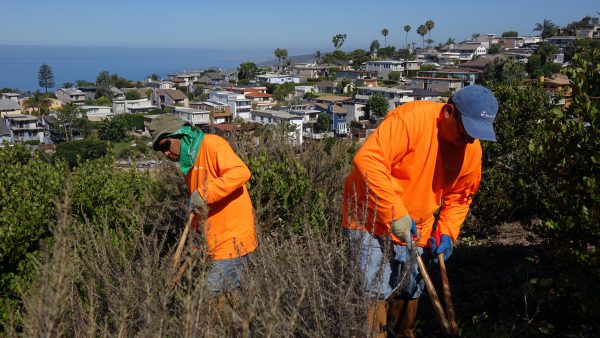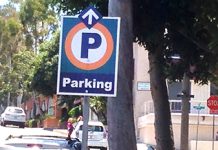
The Laguna Beach Planning Commission will consider a list of tweaks to city law on Wednesday intended to streamline the design review process, including looser regulation of wildfire fuel modification zones and minor changes to building plans.
Narrowing the purview of the Design Review Board was a central topic of the 2018 election and is coming to a head less than two weeks before the General Election. A central theme was giving city staffers the authority to unilaterally approve projects that currently require a hearing of the Design Review Board.
If approved, the changes related to wildfire fuel modification zones could have a consequential impact on public safety by offering a streamlined path for homeowners looking to remove dry vegetation from their property.
The Emergency and Disaster Preparedness Committee (EDPC) has worked with the Laguna Beach Fire Department to develop these proposed changes.
New construction and major remodels in Laguna Beach’s Fuel Modification areas require a fuel modification program, which essentially trims back landscaping to create a defensible space for firefighters. The proposed amendment extends this requirement to properties in CalFire’s Very High Fire Hazard Severity Zone, which includes more than 90% of Laguna Beach homes. The EDPC has recommended the City Council waive all fees for review of projects consisting solely of new or modified fuel modification program.
“This change is necessary to comply with state requirements and will bring the City more in alignment with the State’s wildland-urban interface fire safety requirements,” Jim Pechous, assistant director of community development, wrote in a staff report.
The proposed change would also eliminate a requirement that Fuel Modification programs be approved by the Design Review Board and change it to an exception to be reviewed by the Community Development Director and Fire Marshal.
If approved, the city law would also allow a limited intrusion of fuel modification programs into environmentally sensitive areas “when deemed necessary by the Fire Chief to [protect] health, safety, and welfare.” This pruning would still require a biological and geotechnical study and a Coastal Development permit, according to the staff report.
In the middle of another record-breaking wildfire season that has season more than 1 million acres burn in California in just the last month, there is new urgency among many residents concerned about disaster preparedness to get these changes approved quickly.
“We all need to be passionate about this,” said Matt Lawson, chair of the Emergency and Disaster Preparedness Committee. “We’re all on this together. If the interface neighborhoods burn you’re going to have ember fires burn a good part of the city.”
The proposed changes to city law that would allow property owners to trim vegetation in environmentally sensitive habitat areas (ESHA) is opposed by members of the environmental protection community who say it’s a vital natural resource for threatened plants and animals.
“While we are glad the City has ceased moving forward without proper studies and protections in place, we would like to see the City complete its CDP application for the [fuel modification zones] that have been such a challenge each year, and require far too much debate after all these many decades of discussion. Simply put, ESHA needs to be protected and preserved and fuel mod programs that intrude into ESHA need to be prohibited,” Penny Elia, president of the Save Hobo & Aliso Ridge Task Force, wrote in an email to the Planning Commission.
In addition to these public safety matters, the Planning Commission will also consider a host of tweaks that could offer relief to Laguna Beach property owners remodeling their homes.
In 2019, the Community Development Department processed 146 applications requesting changes to plans previously approved by the Design Review Board. Over half of these applications required board members’ approval. For example, relocating a window by more than one foot on a previously-approved home remodel requires a hearing. The proposed amendments would exempt such a minor change so long as there are no privacy impacts.
There would also be looser regulation on exterior modifications to less than 50% of any street-facing facade that does not change a building’s architectural style, repainting existing structures provided the existing color wasn’t required to address a design-related issue, and allow skylights with automatic nightshades.
Another change would also shift approval of lot line adjustments from the City Council to the Planning Commission. City staff anticipate this would reduce the time it takes to process a lot line adjustment.
The extensive list of changes is summarized in a 10-page staff report attached to dozens of pages of red-lined code amendments.
Meg Monahan, the immediate former chair of the Design Review Board, voiced concerns about the city’s effort to strip oversight powers from the panel.
“I have an overarching concern that many of the changes are not streamlining, but instead shifting responsibilities from a five-member citizen board to city staff,” Monahan wrote in an email to the Planning Commission.
Among the benefits of these board reviews are the different viewpoints that make up the overall decision, site visits are performed, the board has a deeper understanding and appreciation of Laguna Beach neighborhoods, and paying board members for these reviews is much less expensive than staff time, Monahan said.




